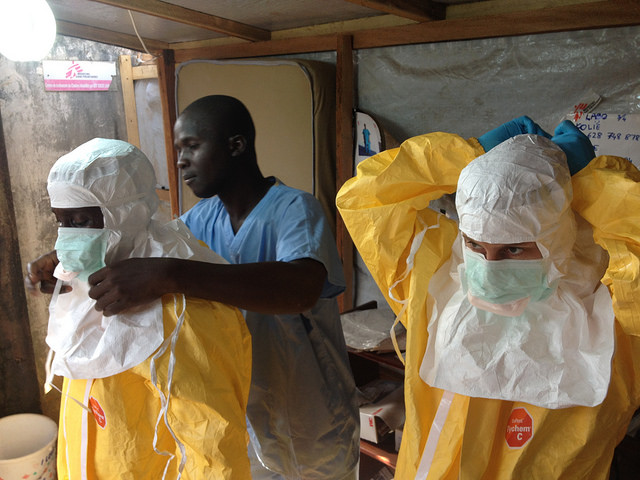Should Flights Be Cancelled?
As news comes in from New York of airplane cabin-cleaning staff going on strike at La Guardia airport, the debate is gaining strength.
Should all flights out of West Africa be cancelled until the Ebola epidemic is under control?
The workers, who began a 24-hour strike on 8th October, are growing increasingly concerned about the risk they are putting themselves in on a daily basis. They have regular contact with urine, faeces and vomit due to passengers being in contained spaces on flights, with often only one toilet on the whole aircraft.
One of the workers, Cabin cleaner Marisa Collado, said in Spanish, “When we clean toilets we don’t know if they are infected with Ebola.”
Another cabin cleaner Sherekul Islam added, “We are always with feces and near garbage.”
The WHO (the World Health Organisation) has, so far, not put any restrictions in place saying,
“We would have to consider any travel recommendations very carefully, but the best way to stop this outbreak is to put the necessary measures in place at the source of infection.” The main concern the Who have is that medical experts will be prevented from reaching those most at need and they say “marginalizing the affected population and potentially worsening [the crisis].”
According to Wikipedia, there have now been cases of Ebola in 13 separate countries, with Guinea, Liberia and Sierra Leone being the worst hit. A minor epidemic was reported in Nigeria after an individual travelled by plane to Lagos Nigeria, which has 21 million inhabitants. Nigeria reports that due to quick action taken, they are confident that it is under control and they will be able to declare that they have contained it shortly. The WHO confirmed as of 22nd September 2014 Nigeria had 20 confirmed cases and eight deaths.
Dallas has also had it’s own case of Ebola after an infected man travelled from Liberia to Dallas. This was the first case diagnosed in the United States and there is now growing concern as Ebola can stay incubated in the system for up to three weeks before any symptoms show.
Following the death of the male in the United States, it brought the whole cause much closer to home for much of the Western world. It alerted a lot of people to the risk that it was simply a flight away from infecting their hometown or city.
A concern that is being raised is that people can board planes without even realizing they have the virus. Although checks are now being carried out at airports, symptoms can go undetected, and by the time the person is at a serious stage, there is a worry that many others have already been affected, although the CDC reports that an asymptomatic person cannot spread the virus.
The Emirates airline became the first major one to completely drop its flights to West Africa. Others include British Airways, Air Cote d’Ivoire and Asky Airlines. Kenya’s airlines have also suspended flights to affected areas, however, Kenya’s President Uhura Kenyatta has asked for the world not to shun the people of West Africa.
As more airlines cancel flights to the worst hit areas, Kenyatta responds saying, “Ebola is there but we will conquer. We will defeat it.” Kenyatta has also accused the west of being slow to respond saying, “The kind of response given to the affected countries is not the kind of response we would have seen if this happened somewhere in Europe or America.”
Northeastern University published a study carried out by Alex Vespignani, a professor at the Laboratory for the Modeling of Biological and Socio-Technical Systems. Vespignani carried out research into the possibility of Ebola reaching Europe. His studies concluded that there is a 75 percent chance of the virus reaching France by October 24th and 50 percent chance of it reaching Great Britain. With flight restrictions in place, those numbers reduce to 25 and 15 percent respectfully. According to the study, Belgium has a 40 percent chance while Spain and Switzerland’s risks are around 14 percent.
Vespignani speaks of the findings saying,
“This is not a deterministic list, it’s about probabilities—but those probabilities are growing for everyone. It’s just a matter of who gets lucky and who gets unlucky. Air traffic is the driver. But, there are also differences in connections with the affected countries (Guinea, Liberia and Sierra Leone), as well as different numbers of cases in these three countries – so depending on that, the probability numbers change.”
While the rest of the world thinks of whether or not it is a good idea to cease transport from infected areas, these restrictions place a huge strain on already suffering areas. A spokesperson for the United Nations reported that price of some food staples had gone up by 150 percent due to cross-border trade collapsing. The fear is that if restrictions continue food shortages are to be guaranteed.
Although tighter controls are being put in place at airports all over the world, with screening and quarantine procedures, not all countries agree that this is required. Others, including the United Kingdom, believed they were at such low risk these precautions were unnecessary.
However, in the last couple of days London stated that enhanced screening will now be in place within days at major airports. A statement from Prime Minister David Cameron’s office said “Enhanced screening will initially be implemented at London’s Heathrow and Gatwick airports and Eurostar terminals.”
References:
(1) Reuters
(2) World Heath Organization
(3) Wikipedia
(4) Northeastern.edu
(5) Gov.uk
**
Relephant Read:
The Truth About Ebola
~
~
Love elephant and want to go steady?
Sign up for our (curated) daily and weekly newsletters!
Editor: Emily Bartran
Photo: European Commission/Flickr







Read 2 comments and reply